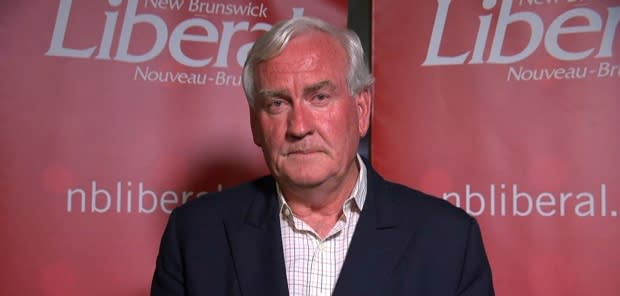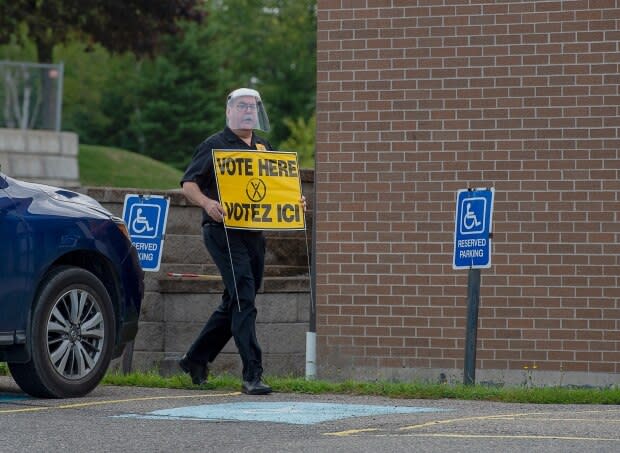Pandemic plaudits and a linguistic divide give Blaine Higgs the majority government he wanted

Blaine Higgs has two things he can credit for his party's victory in Monday's election in New Brunswick, Canada's first election held during the COVID-19 pandemic. One is the strong support for his handling of the outbreak. The other is a linguistic divide in the province that has only grown wider since he first came to office in 2018.
In that election two years ago, the Progressive Conservatives finished second in the popular vote and only one seat ahead of the incumbent Liberals. After they ousted former premier Brian Gallant, the PCs presided over a fragile minority government thanks to the support of three MLAs from the People's Alliance.
In the early months of 2020, there was some doubt that the PCs could survive much longer. Their only francophone member of caucus, Robert Gauvin, quit the government and sat as an Independent, upending the careful balance of the legislature.
But then the COVID-19 pandemic turned politics upside down, transforming partisanship into collaboration. Higgs's popularity soared, rising from sub-50 per cent to as much as 80 per cent in the spring. Support for his Progressive Conservatives also rose — not nearly as dramatically but enough to put a majority government in his grasp.
An election call didn't change that.
The PCs secured 27 seats, two more than are needed for a majority government in the 49-seat legislature. They did it with 39.3 per cent of the vote, the lowest popular vote for a majority government in New Brunswick's history. But that represented a gain of 7.5 percentage points over 2018, as the Liberals under rookie leader Kevin Vickers slumped 3.5 points to 34.3 per cent of the vote and just 17 seats.
That province wide shift in support, however, masked what happened between the two linguistic communities in Canada's only officially bilingual province.
Linguistic divide widens between Liberals and PCs
The old political divisions between francophones and anglophones in New Brunswick returned in 2018, with the Liberals winning majority-francophone ridings by a margin of 35 points and the PCs winning majority-anglophone ridings by 10 points.
On Monday, both of those margins increased.
The PCs dominated the anglophone vote in southern New Brunswick, winning the province's majority-anglophone ridings by 29 points, with 49 per cent of the vote (an increase of 11 points) to 20 per cent for the Liberals and 15 per cent for the Greens. These ridings delivered six gains to the PCs, five of them ridings won by the Liberals in 2018 and one that had previously belonged to the People's Alliance.
Among majority-francophone ridings, the Liberals won by a margin of 41 points and saw their share of the vote increase by five points to 62 per cent. The PCs fell only slightly to 21 per cent, followed by the Greens at 15 per cent. The Liberals won all but one of these 16 ridings, with the Greens winning the other.
These lopsided numbers work to the PCs' electoral advantage — anglophones make up the majority of voters in two-thirds of New Brunswick's ridings. But it was these gains alone that delivered Higgs his majority.
PCs won seats with the help of Alliance, Liberal voters
It was a carefully targeted majority. Only seven seats changed hands from the last election, six of them gains by the PCs. The only Liberal gain was in Shippagan-Lamèque-Miscou, almost entirely attributable to Gauvin's decision not to run again for the PCs and instead carry the Liberal banner elsewhere.
These PC gains came predominantly in urban ridings, with the help of voters who had previously supported either the People's Alliance or Liberals.
The PCs won both Fredericton-York and Fredericton North thanks in large part to a swing from the People's Alliance to the PCs. Carleton-Victoria in the western portion of the province also appears to have been won thanks to Alliance-PC switchers. These three seats made the difference between a majority or minority government.

The Liberals, however, also appear to have lost voters to the PCs. Moncton South and Moncton East were gained by the PCs with corresponding losses in Liberal support.
It was in urban New Brunswick that Liberal losses hurt that party the most. They finished second in Moncton — a city they won in 2018 — and were a distant runner-up in Saint John. The Liberals finished fourth in Fredericton. Losses in those last two cities pushed the Liberals entirely out of the south of the province. Their provincial vote share was roughly even with the party's performance in 2010, the worst in its history, though the party won more seats under Vickers, who announced on Monday he was resigning as leader.
Greens fail to make good on late polling surge
The Liberals weren't helped by the staying power of the Greens. The party was up three points over 2018 to 15.4 per cent, but it only got leader David Coon the same three seats his party won last time.
It could have been much better for the Greens — and much worse for the Liberals. The last polls of the campaign suggested the Greens could surpass 20 per cent, eating into Liberal support and potentially splitting the vote to the PCs' advantage.
In the end, it doesn't appear that such a vote split had much to do with any of the PC gains, though it may have contributed in a minor way to PC victories in Fredericton North and Saint John Harbour.

And while the increase in the popular vote does continue the Green Party's record of progress in provincial elections across the country in recent years, the results don't necessarily give a strong indication that the Greens are on the cusp of another breakthrough. Only in Fredericton North did a second-place Green candidate finish within 10 percentage points of the winner.
But the Greens can take solace in their third-party status being confirmed — thanks to the collapse of the New Democrats. With just 1.7 per cent of the vote, this was the worst performance for the New Brunswick NDP since its first election in 1967, when it presented only three candidates.
The continued presence of Kris Austin and the People's Alliance has also been confirmed. That's no small feat, as this is the first time in New Brunswick history that parties other than the Liberals or Conservatives have won multiple seats in consecutive elections. At 9.2 per cent of the vote, the People's Alliance even beat its polls, a rarity for smaller parties.
Lessons from the COVID-19 campaign trail, with an asterisk
For politicians outside of New Brunswick, the election provides a few important lessons. The first is that campaigning in a pandemic can be done safely. The second is that voters will not necessarily revolt against an election in the shadow of COVID-19 — turnout was roughly on par with last time — and might even reward a governing party for a job well done.
Saskatchewan is holding a scheduled provincial election next month and undoubtedly will have some practical lessons to learn from the experience of New Brunswick.
But the leaders of minority governments might want to think twice before trying to follow Higgs's lead.

Speculation is rife that British Columbia Premier John Horgan may pull the plug on his minority NDP government. Federal opposition leaders will soon have to decide whether or not to defeat Prime Minister Justin Trudeau's Liberal government in Ottawa when they vote on the speech from the throne later this month.
But it was the work of New Brunswickers (including their government) that put them in the position where an election could be held with lower risk. The province reported only one new case on Monday. B.C., on the other hand, announced 317 new cases over the weekend. Ontario, Quebec and Alberta totalled over 700 new cases between Sunday and Monday alone.
It's one thing to send voters to the polls when new cases are on the rise. It's quite another to do it when the outbreak is under control. Canada's first experience of an election during the COVID-19 pandemic was nearly a best case scenario.
It certainly was for Blaine Higgs. But that's no guarantee the next experience will work out as well.


